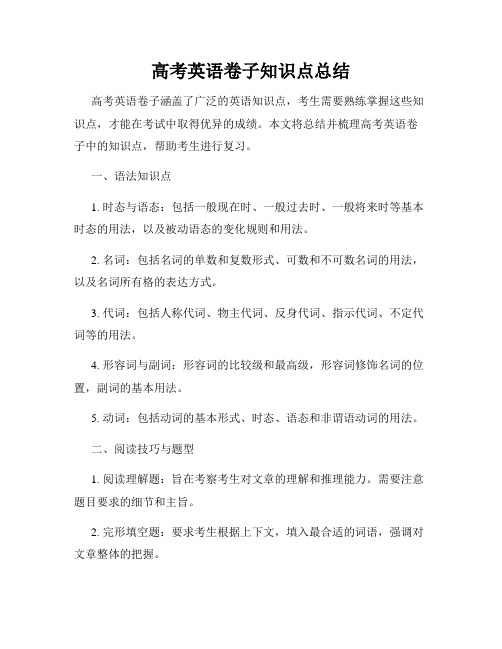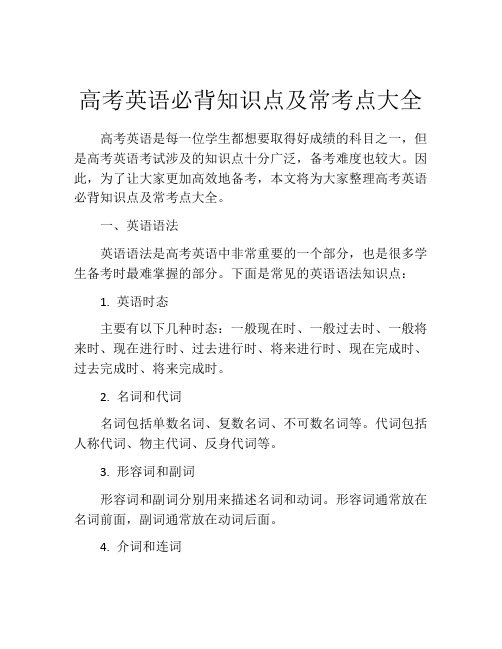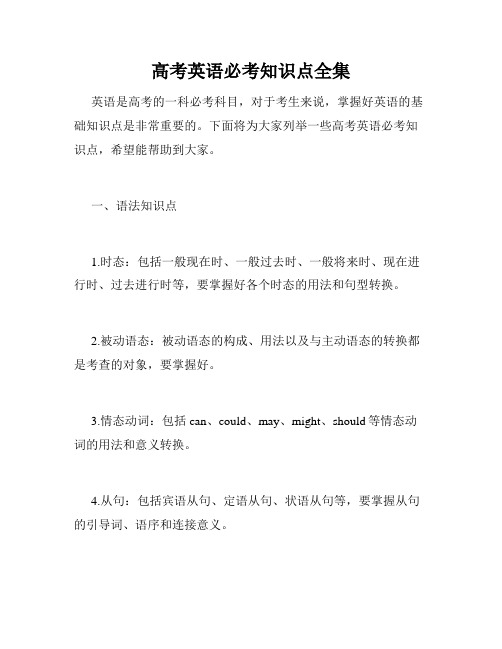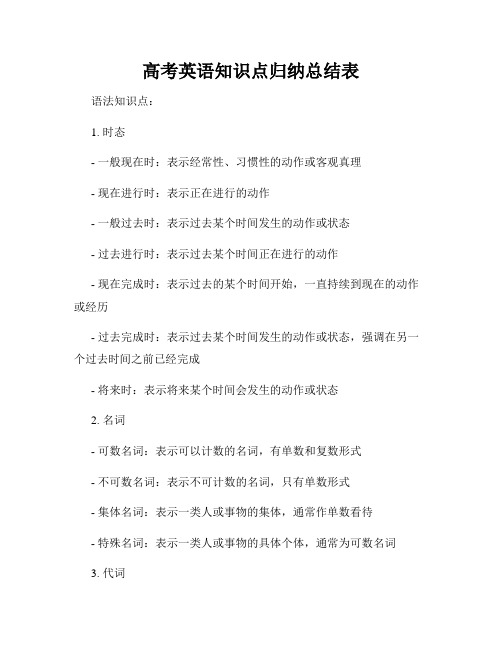高考英语知识点总结(超全版)
高考英语卷子知识点总结

高考英语卷子知识点总结高考英语卷子涵盖了广泛的英语知识点,考生需要熟练掌握这些知识点,才能在考试中取得优异的成绩。
本文将总结并梳理高考英语卷子中的知识点,帮助考生进行复习。
一、语法知识点1. 时态与语态:包括一般现在时、一般过去时、一般将来时等基本时态的用法,以及被动语态的变化规则和用法。
2. 名词:包括名词的单数和复数形式、可数和不可数名词的用法,以及名词所有格的表达方式。
3. 代词:包括人称代词、物主代词、反身代词、指示代词、不定代词等的用法。
4. 形容词与副词:形容词的比较级和最高级,形容词修饰名词的位置,副词的基本用法。
5. 动词:包括动词的基本形式、时态、语态和非谓语动词的用法。
二、阅读技巧与题型1. 阅读理解题:旨在考察考生对文章的理解和推理能力。
需要注意题目要求的细节和主旨。
2. 完形填空题:要求考生根据上下文,填入最合适的词语,强调对文章整体的把握。
3. 改错题:要求考生在给定的句子中找出错误并进行改正,考查语法和用词准确性。
4. 句子转换题:要求考生根据提示完成句子转换,考查对语法规则的掌握程度。
5. 补全对话题:要求考生根据对话内容,选择最合适的选项,使对话完整流畅。
三、写作技巧1. 作文类型:包括记叙文、说明文、议论文等。
不同类型的作文要求考生掌握不同的写作技巧。
2. 写作结构:要求考生有良好的篇章结构,包括引言、主体和结尾部分,使文章层次清晰。
3. 语言表达:要求考生运用丰富多样的词汇和句型,使文章更加生动、有吸引力。
四、听力技巧1. 听对话理解:要求考生通过听对话内容,回答与对话相关的问题,考查对具体细节的把握。
2. 听短文理解:要求考生通过听短文,回答与短文内容相关的问题,考查对整体理解的能力。
3. 听长文理解:要求考生通过听长文,回答与长文内容相关的问题,考查对整体理解的能力。
五、口语技巧1. 口语交际:要求考生能够运用英语进行基本的问答,进行日常交流。
2. 口语表达:要求考生能够用流利、准确的语言进行表达,注意语音、语调和语速的合理运用。
高考英语知识点汇总

高考英语知识点汇总高考英语是中国高中生面临的一项重要考试,涵盖了语法、词汇、阅读理解、写作等多个知识点。
下面将对高考英语的知识点进行详细介绍。
一、语法知识1. 时态:包括一般现在时、一般过去时、一般将来时、现在进行时、过去进行时、过去将来时等。
2. 语态:包括主动语态和被动语态。
3. 名词:包括可数名词和不可数名词,以及名词的复数形式。
4. 形容词和副词:包括形容词和副词的比较级和最高级形式,以及副词的位置等。
5. 代词:包括人称代词、指示代词、反身代词、不定代词等。
6. 介词:包括常见的介词及其使用方式。
7. 连词:包括并列连词和从属连词,以及它们的使用方式。
8. 倒装句:包括完全倒装和部分倒装等。
9. 并列句和复合句:包括简单句、并列句和复合句的构成和使用方式。
10.情态动词:包括can/could、may/might、must、shall/should等情态动词的用法。
二、词汇知识1. 同义词和反义词:包括同义词和反义词的辨析和使用。
2. 词组和固定搭配:包括常见的词组和固定搭配的使用。
3. 短语动词:包括常见的短语动词及其搭配。
4. 词性转换:包括名词、形容词、副词和动词之间的转换。
5. 时态转换:包括动词时态的转换,如一般现在时转一般过去时等。
三、阅读理解1. 题型:包括选择题、填空题、判断题、匹配题和主旨大意题等。
2. 阅读技巧:包括快速阅读、略读、细节理解、推理判断以及做题技巧等。
3. 文章类型:包括新闻报道、广告、说明文、议论文等不同类型的文章。
四、写作技巧1. 作文类型:包括记叙文、说明文、议论文、应用文等不同类型的作文。
2. 写作结构:包括开头、主体和结尾的写作技巧。
3. 表达方式:包括使用恰当的句式、词汇和连词等。
4. 语法和拼写:包括语法和拼写的正确性。
五、听力技巧1. 听力题型:包括短对话、长对话、短文听力和填表格等不同类型的听力题目。
2. 注意事项:包括提前预测答案、注意听关键词等听力技巧。
高考英语知识点全汇总

高考英语知识点全汇总高考英语考试是每个学生在学业中的重要挑战之一,其中涵盖了广泛的知识范围。
了解并掌握高考英语知识点对于取得优异的成绩至关重要。
下面将为大家对高考英语知识点进行全面的汇总。
一、语法知识点1. 时态:- 一般现在时:表示经常性、习惯性或普遍真理;- 现在进行时:表示正在进行的动作;- 一般过去时:表示过去某个时间发生的动作或状态;- 过去进行时:表示过去某个时间正在进行的动作;- 现在完成时:表示过去发生的事情对现在造成的影响;- 过去完成时:表示过去的过去;- 将来时:表示将来某个时间发生的动作。
2. 语态:- 主动语态:强调动作的执行者;- 被动语态:强调动作的承受者。
3. 动词的非谓语形式:- 动名词:作主语、宾语、表语等;- 不定式:作宾语、后置定语、表语等;- 分词:分为现在分词和过去分词,作状语、定语、宾语等。
4. 名词:- 可数名词和不可数名词;- 单数和复数形式;- 特殊名词的变化形式。
5. 代词:- 人称代词:主格、宾格、形容词性物主代词、名词性物主代词等;- 指示代词:this、that、these、those等;- 不定代词:somebody、anybody、something、anything等。
6. 冠词:- 定冠词:the;- 不定冠词:a、an;- 零冠词:没有冠词。
7. 形容词和副词的比较级和最高级。
二、词汇与短语1. 同义词与反义词2. 常用短语与惯用表达3. 常见的固定搭配与短语动词4. 常用形容词与副词5. 常用的连词与过渡词三、阅读理解1. 掌握不同类型的阅读理解题型,如事实细节题、推理判断题、主旨大意题等;2. 提高阅读速度和理解能力;3. 注意文章中的关键词和词义推断。
四、写作要点1. 完成书面表达任务需注意文体和结构;2. 表达清晰、逻辑流畅;3. 使用恰当的词汇和句型;4. 注意书写规范、标点符号和拼写。
五、听力技巧1. 听清题目要求;2. 集中注意力,提高听力理解能力;3. 注意听力材料中的关键信息。
高考英语必背知识点及常考点大全

高考英语必背知识点及常考点大全高考英语是每一位学生都想要取得好成绩的科目之一,但是高考英语考试涉及的知识点十分广泛,备考难度也较大。
因此,为了让大家更加高效地备考,本文将为大家整理高考英语必背知识点及常考点大全。
一、英语语法英语语法是高考英语中非常重要的一个部分,也是很多学生备考时最难掌握的部分。
下面是常见的英语语法知识点:1. 英语时态主要有以下几种时态:一般现在时、一般过去时、一般将来时、现在进行时、过去进行时、将来进行时、现在完成时、过去完成时、将来完成时。
2. 名词和代词名词包括单数名词、复数名词、不可数名词等。
代词包括人称代词、物主代词、反身代词等。
3. 形容词和副词形容词和副词分别用来描述名词和动词。
形容词通常放在名词前面,副词通常放在动词后面。
4. 介词和连词介词和连词用来连接词语,介词通常放在名词或代词前面,连词用来连接词语或句子。
5. 句型常见的句型有陈述句、疑问句、祈使句、感叹句等。
二、词汇高考英语中,词汇量是很重要的一个方面。
下面是高考英语常见的词汇知识点:1. 同义词和反义词同义词指的是意思相同或相近的词,反义词则指的是意思相反的词。
2. 前缀和后缀前缀和后缀指的是词根前面或后面的一些字母,用来改变词义。
3. 词形变化词形变化指的是单数名词变成复数名词,动词变化成不同的时态等。
4. 词义辨析词义辨析指的是相似但细微差异的单词之间的区别,如effect和affect等。
三、阅读理解阅读理解是高考英语中的重头戏,通常占据比较多的分数,因此要认真准备。
下面是阅读理解需要注意的知识点:1. 词汇理解要能够正确理解课文中的词汇,而不是仅根据字面去理解,同时还要掌握一些固定的短语和表达方式。
2. 语法分析要能够正确理解课文中的语法结构,包括句子主谓宾、修饰语、同位语等。
3. 推理判断要能够根据课文中的信息进行推理和判断,并能够理解作者的观点和态度。
四、写作高考英语中的写作部分通常包括作文和翻译。
高考英语知识点全面归纳总结

高考英语知识点全面归纳总结英语作为高中阶段最重要的科目之一,对于广大学生来说,备考高考英语是一项十分重要的任务。
为了帮助大家更好地备考英语,以下是对高考英语知识点的全面归纳总结。
一、语法知识点总结1. 时态与语态:包括一般现在时、一般过去时、一般将来时、现在完成时、过去完成时、被动语态等;2. 从句与主从复合句:主语从句、宾语从句、定语从句、状语从句等;3. 名词:可数名词与不可数名词、所有格等;4. 动词:不定式、动名词、过去分词等;5. 介词:常见介词的用法及特殊短语;6. 代词:人称代词、指示代词、反身代词等;7. 形容词与副词:常见形容词与副词的用法及比较级、最高级等;8. 连词:并列连词、转折连词、条件连词等;9. 句子成分:主语、谓语、宾语、表语、定语、状语、宾补、主补等;10. 倒装与强调:部分倒装、完全倒装、强调句型等。
二、词汇知识点总结1. 同义词与近义词辨析;2. 常见词汇搭配与习惯用语;3. 前缀与后缀的构词法;4. 常见冷门词汇;5. 高频词汇记忆与应用。
三、阅读理解知识点总结1. 阅读技巧与策略:主旨题、细节题、推理题等;2. 词义猜测与句意理解;3. 阅读材料类型:记叙文、说明文、议论文、应用文等;4. 阅读技巧与解题步骤;5. 常见题型辨析与解答方法。
四、写作知识点总结1. 写作结构与篇章连贯:开头、结尾、段落划分等;2. 写作技巧与表达准确性;3. 作文类型:记叙文、说明文、议论文、应用文等;4. 段落写作与句子优化;5. 作文评分标准与改进方案。
五、听力技巧与知识点总结1. 听力材料类型:对话、独白、讲座等;2. 常见听力题型与解题技巧;3. 听力策略与准确度;4. 常见听力场景与对话表达;5. 听力原文理解与复述。
综上所述,高考英语的备考无非考察语法、词汇、阅读理解、写作和听力技巧等方面的知识点。
只有全面系统地掌握这些知识,才能够更好地应对高考英语,取得理想的成绩。
高三英语必考知识点归纳

高三英语必考知识点归纳第一部分:语法知识1. 时态和语态高考英语中常见的时态有一般现在时、一般过去时、一般将来时、现在进行时、过去进行时、现在完成时、过去完成时等。
此外,还需掌握被动语态的构成和用法。
2. 名词性从句名词性从句包括主语从句、宾语从句、表语从句和同位语从句。
掌握不同类型名词性从句的引导词和基本句型结构。
3. 并列句和复合句并列句是由两个或多个相互独立的简单句通过连接词连接而成,如and, but, or等。
复合句是由一个主句和一个或多个从句组成,从句可以是名词性从句、形容词性从句和副词性从句。
4. 倒装英语中的倒装有完全倒装和部分倒装两种形式。
完全倒装主要出现在以否定副词、表示地点的副词或短语开头的句子,部分倒装主要出现在以表示否定意义的词开头的句子。
5. 主谓一致主谓一致是指主语和谓语在人称和数上要保持一致。
在高考中,常见的主谓一致错误是由于主语与谓语之间入了限制性或非限制性定语从句,使得谓语动词的形式发生变化。
6. 直接引语和间接引语直接引语是将别人的原话完全引用过来,需要使用引号。
间接引语是将别人的原话进行转述,不需要使用引号。
7. 非谓语动词非谓语动词包括不定式、动名词和分词。
需掌握不同类型非谓语动词的结构和用法。
8. 从句的省略英语中的从句在特定情况下可以省略主语、谓语、表语等成分。
第二部分:词汇和固定搭配1. 同义词和反义词在高考英语中,同义词和反义词的认识对于理解阅读材料和选择正确答案非常重要。
2. 词义辨析词义辨析是高考中常见的题型,考查学生对不同词义的理解能力。
3. 短语动词和惯用表达高考中常见的短语动词有look after, take care of, put off等。
惯用表达是一些固定的词组,如in the meantime, by the way等。
4. 词形变化词形变化包括名词、动词、形容词和副词的变化,需要掌握不同词类之间的变换规则。
5. 常见熟词生义和熟词偏义高考英语中经常用到的一些单词有多种意义,需通过上下文来判断其具体含义。
高考英语必考知识点全集

高考英语必考知识点全集英语是高考的一科必考科目,对于考生来说,掌握好英语的基础知识点是非常重要的。
下面将为大家列举一些高考英语必考知识点,希望能帮助到大家。
一、语法知识点1.时态:包括一般现在时、一般过去时、一般将来时、现在进行时、过去进行时等,要掌握好各个时态的用法和句型转换。
2.被动语态:被动语态的构成、用法以及与主动语态的转换都是考查的对象,要掌握好。
3.情态动词:包括can、could、may、might、should等情态动词的用法和意义转换。
4.从句:包括宾语从句、定语从句、状语从句等,要掌握从句的引导词、语序和连接意义。
5.并列连词:包括and、but、or、so、however等,并列连词的用法和连接意义也是考查的内容。
二、词汇知识点1.同义词和近义词:如large和big、 clever和smart等,要掌握它们的用法和区别。
2.反义词:如happy和sad、hot和cold等,要掌握它们的用法和意义。
3.固定搭配:一些短语和搭配在高考中经常出现,如take part in、in order to等,要掌握它们的用法。
4.词性转换:包括名词、动词、形容词、副词等的词性转换,要掌握好。
5.词汇辨析:如too和very、real和actual等,要注意它们的用法和区别。
三、阅读理解知识点1.主旨大意:通过阅读一篇短文,理解文章的主题和中心思想是考试中常见的题型。
2.细节理解:通过阅读一篇短文,找出其中的细节信息,例如时间、地点、人物等。
3.推理判断:通过短文中的一些线索,进行推理判断,如作者的观点、作者想要表达的含义等。
4.语言表达:通过语言表达的方式,理解作者的态度、意图和感情色彩等。
5.文章结构:了解文章的结构,包括引言、主体和结尾,以及各个部分之间的逻辑关系。
四、写作知识点1.开头段落:开头段落要简洁明了,能引起读者的兴趣。
2.主体段落:主体段落要有明确的主题和合理的段落结构,要注意使用恰当的连接词。
高考英语知识点归纳总结表

高考英语知识点归纳总结表语法知识点:1. 时态- 一般现在时:表示经常性、习惯性的动作或客观真理- 现在进行时:表示正在进行的动作- 一般过去时:表示过去某个时间发生的动作或状态- 过去进行时:表示过去某个时间正在进行的动作- 现在完成时:表示过去的某个时间开始,一直持续到现在的动作或经历- 过去完成时:表示过去某个时间发生的动作或状态,强调在另一个过去时间之前已经完成- 将来时:表示将来某个时间会发生的动作或状态2. 名词- 可数名词:表示可以计数的名词,有单数和复数形式- 不可数名词:表示不可计数的名词,只有单数形式- 集体名词:表示一类人或事物的集体,通常作单数看待- 特殊名词:表示一类人或事物的具体个体,通常为可数名词3. 代词- 人称代词:主要有主格、宾格和物主代词,用来代替人或事物- 指示代词:用来指示人或事物的位置或数量- 不定代词:表示不确定的人或事物- 反身代词:代词的一种形式,表示某个动作的承受者同时也是它的执行者4. 形容词和副词- 形容词:描述名词的属性或特点- 副词:描述动词的性质或程度5. 介词和介词短语- 介词:用来表示时间、地点、原因等关系的词- 介词短语:由介词和它后面的名词、代词或动词的“ing”形式组成的词组词汇知识点:1. 同义词和反义词- 同义词:意思相近或相同的词- 反义词:意思相反的词2. 动词短语- 动词短语:由动词和它后面的副词或介词组成的短语3. 词性转换- 名词转动词:将名词转换为相应的动词形式- 动词转名词:将动词转换为相应的名词形式- 形容词转副词:将形容词转换为相应的副词形式4. 习惯用语和固定搭配- 习惯用语:经常出现在表达中的固定词组,具有特定的意境和语法用法- 固定搭配:由几个词汇组合而成,在用法上有一定的固定性阅读技巧:1. 主旨大意- 找出文章的主题或大意,理解作者的中心思想2. 词汇推断- 根据上下文和自身的词汇积累,推测词义的意思3. 推理判断- 根据文章的逻辑关系和信息细节进行推理判断4. 细节理解- 注意细节信息,识别关键词语和具体细节,帮助理解文章的整体意义5. 段落结构- 通过段落的开头和结尾,了解段落的主题和信息组织方式写作技巧:1. 写作结构- 开头部分:引入主题,概括文章要点- 主体部分:展开论述,可分小节进行论述- 结尾部分:总结观点,提出建议或展望未来2. 逻辑连贯- 使用恰当的连接词和连接词组,使得文章的内容和观点之间有逻辑的连贯性3. 表达准确- 注意词汇和语法的正确性,避免使用模糊或不准确的表达方式4. 简明扼要- 尽量用简练的语言表达观点,避免冗长和复杂的句子结构5. 选材合适- 根据题目要求和文章主题,选择合适的例子、论据或事实来支持观点以上是高考英语知识点的归纳总结表,通过对这些知识点的掌握和运用,你将能够更好地应对高考英语考试。
- 1、下载文档前请自行甄别文档内容的完整性,平台不提供额外的编辑、内容补充、找答案等附加服务。
- 2、"仅部分预览"的文档,不可在线预览部分如存在完整性等问题,可反馈申请退款(可完整预览的文档不适用该条件!)。
- 3、如文档侵犯您的权益,请联系客服反馈,我们会尽快为您处理(人工客服工作时间:9:00-18:30)。
1 / 131.a great/good many: a large number of许多。
修饰可数名词复数。
I’m quite busy. I have a great many things to do. 我很忙,我有很多事要做。
若复数名词前有限定词或其修饰的为代词时,应加of .①A great many of the books have been sold out. 已经卖了很多书了。
②A great many of them are out of work.他们很多人失业了。
2.able(可以的,有能力的,可能的)①He is an able man.那人本事不小。
enable(v)使……能②We must learn more to enable us to face all the difficulties.我们要多学知识以便能面对各种困难。
disable:有残疾的,不能干的;the disabled表示一类人(残疾人)able作词辍时①可以……的,值得……的(有被动含义)eatable可食用的,measurable可以测量、估计的;readable可读的②其他含义:conformable舒适的、安逸的;suitable 合适的,恰当的3.above, over, on三个词都可以表示“在……上“,但用法不同。
On表示与某物体表面接触;over表示在某物体垂直的上方,含“布满、覆盖、跨越”之意,与under 相对;above表示位置高于,但不一定垂直,与below 相对。
注意:与数字、数量、长度词连用时,多用over,同more than。
如:over10,000people一万多人;表示年龄、刻度多用above,如a man above fifty五十开外的人;above zero零度以上。
习惯用语:well above average远在一般以上;above sea-level海拔以上;the one above上面的一个;above all首先,尤其重要的是;over there 那边;all over 遍及;over again 再一遍;over and over再三地[应用]介词填空①There lay an umbrella_______the table and some raincoats _____it.②The mother held an umbrella______the boy’s head so that the sun wouldn’t burn him.③There seemed to be a war and many planes were flying____the city.④The moon was______the trees in the east.Key:①on,under ②over ③over ④aboveabove all 首先,特别是,最重要的是after all 到底,毕竟at all (用来加强语气)与not连用,表示“一点也不,完全不”。
in all 总共all but 几乎,差点没(=almost,nearly)①We have all but finished the work.②The day turned out fine after all.③Children need many things ,but above all they need love.④He wasn’t at all tired.⑤Do you feel ill at all(真的,确实)?⑥There were twenty in all at the party.accident/event/ incidentevent一般指重大事件。
accident多指意外或偶然发生的事故,特别是不幸的、有损害性的事故。
incident相对于accident来说,显得不很重要,指“小事件”,它还可以用来表示“事变”,如叛乱、爆炸等。
如:The broadcaster is broadcasting the news on current events.广播员正在播报时事新闻。
He was badly injured in the traffic accident.在那起交通事故中,他严重受伤。
There was an incident on the bus: a man fought with the conductor.那辆公共汽车上发生了一件事,有个人和售票员打了起来。
Have you heard of Xi’an Incident?你听说过“西安事变”吗?admit vt.①接纳,许可……进入(allow sb./sth.to enter)He was admitted to the school this year.Only two hundred boys and girls are admitted to our school every year.②承认,后可接名词,doing、从句或复合结构。
I admit my fault. She admitted having read the letter. He admitted that his comprehension was weak.You must admit the task to be difficult.advice建议;劝告。
是不可数名词,“一条建议”应用a piece of advice。
常用结构。
give sb.advice(on)/give advice给某人提(关于……的)建议;忠告某人。
ask(sb.)for advice征求(某人的)意见。
①Marx gave us some good advice on how to learn a foreign language.关于如何学好外语,马克思给我们提了些好建议。
②If you take /follow my advice, you’ll pass the exam.如果你听从我的建议,你会考试及格的。
③Let’s ask our teacher for some advice.咱们征求一下老师的意见吧。
admire(= respect / praise)vt.羡慕,钦佩,夸奖admire sb.(for sth.)佩服某人某事Visitors to Beijing greatly admire our Palace Museum. 去北京的游人极其羡慕我们的故宫。
I admire him for his wisdom.我佩服他的智慧。
别忘了夸奖孩子。
对比:envy(= jealous)vt.嫉妨,羡慕envy sb.(sth.)嫉妒/羡慕某人某事We all envy you your good future. 我们都很羡慕你的好运。
advise sb. to do sth.建议某人做某事(suggest不这样用)。
①I advise you to take the chance.我建议你抓住机会。
②—What do you advise me to do?你建议我怎么办?—I advise you not to lose heart; just keep on.我劝你不要灰心,继续干。
advise 还可同suggest一样,后接名词、代词、动名词(短语)和that从句(用虚拟语气)作宾语。
①—What would you advise?你有什么建议吗?—I advise you an early start我建议你早点出发。
②I advise holding a metting to discuss the problem.我建议召开一次会议来讨论这个问题。
③I advise you (should) go to once.我建议你马上去。
advise ,persuadepersuade sb. to do sth.意为“说服某人做某事”,强调劝说成功,说服;advise sb. to do sth. 意为“劝说某人做某事”,不涉及劝说是否有效,相当于try to persuade sb. to do sth.。
如:The doctor persuaded my father to give up smoking.医生说服我爸爸戒了烟。
The doctor advised my father to give up smoking, but failed.医生劝我爸爸戒烟,但没成功。
advise; suggestadvise 与suggest 都可作“建议”讲,二者用法有同有异。
(1)相同点表示建议做某事,advise与suggest都可采用下列三种句型:①+ 名词②+ 动名词③+ that从句(从句中常用should加动词原形,should可以省略。
)eg. He advised/ suggested an early start.He advised/ suggested (our) starting early.He advised/ suggested that we (should) start early.(注:只要是用从句表示建议该做的事,从句中就可用“should+动词原形”,should可以省略。
)上面的第三句可转化为:It was suggested that we (should) start early.What he suggested was that we(should) start early.His suggestion was that we (should) start early.(2)不同点①advise后可以跟人称代词作宾语,而suggest后不可以跟人称代词作宾语。
故可以说:advise sb. to do sth.; advise sb. against (doing) sth.; advise sb. on/ about sth.; suggest(to sb.)that...前三种结构中不可将advise改为suggest,如:他建议我们去参观博物馆。
[正]He advised us to go to visit the museum.[误]He suggested us to go to visit the museum.[误]He suggested us that we go to visit the museum.②suggest还有“暗示、表明、说、指出(一个事实)”的意思。
此时从句中用陈述语气,不用虚拟语气。
